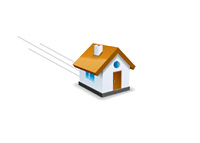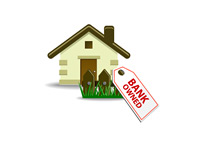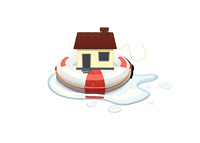Many People Having Their Home Equity Lines of Credit (HELOCs) Suspended or Reduced In Wake of Housing Downturn
 When the housing market was booming just a few short years ago, many homeowners tapped the equity in their homes by taking out a HELOC (Home Equity Line of Credit). With home values soaring, many people chose to borrow money against the equity in their home, rather than selling their home to realize the gain. The prospect of being able to borrow a substantial sum of money at a low rate was appealing for many people.
When the housing market was booming just a few short years ago, many homeowners tapped the equity in their homes by taking out a HELOC (Home Equity Line of Credit). With home values soaring, many people chose to borrow money against the equity in their home, rather than selling their home to realize the gain. The prospect of being able to borrow a substantial sum of money at a low rate was appealing for many people. For many people, the "easy money" was too appealing, and soon they were relying on their home equity lines of credit in order to finance their lifestyles. How will I pay for my new luxury vehicle? HELOC. How will I pay for my $100,000 wedding and honeymoon? HELOC. How will I pay for the new swimming pool and ultra-expensive sound system for my living room? HELOC.
When the market was booming and home values were shooting up every year, many people took advantage by borrowing more and more money. A home equity line of credit works like this - the more equity that you have in your home (home value minus outstanding mortgage and loans), the more that you can borrow. If your home is worth $400,000 and you have a $200,000 mortgage, then you can borrow say, $150,000. If the home increases in value to $500,000, then your borrowing power increases as well.
The trap that many people fell into is that they assumed that home values would increase every year, thus increasing their available borrowing power. Many people counted on their home equity lines of credit to finance their lifestyles, and were borrowing to the maximum every year. When home values would increase, they would apply for more borrowing power (or be granted it automatically, depending on the lender). Many people were spending more than they were making every month, making up the monthly shortfall with their increasing home equity line of credit.
This is great when the housing market is strong and vibrant - however, when the housing market crashes (as it obviously has as of late), many people find that not only can they not obtain more secured financing on their homes, but they may actually have their HELOCs reduced or suspended altogether.
It makes sense - if the value of your home is increasing, you have more equity in your home and will be able to borrow more against the value of your home, because you have more collateral (in the form of your increased equity). However, if home values drop, then it also makes sense that your borrowing power would decrease as well.
This is what is currently taking place. Morgan Stanley apparently informed thousands of their customers (high net-worth customers, no less) that their HELOCs were being reduced and even suspended. Many banks and lending firms want as little exposure as possible to home-value linked loans. Similar moves have been made at other major firms, including JP Morgan Chase & Co. These firms are taking baths on leveraged loans and are putting the brakes on as fast as possible.
Many people across the United States now find themselves in the unenviable position of being underwater on their homes. Many people bought their homes at the top of the market, so being underwater at this point and time is completely logical and expected. However, there are plenty of homeowners that saw the value of their homes increase over 100%, yet they are still underwater. Why? They borrowed money against the equity in their homes all the way up. When the market peaked, they had little equity as it was, because they had borrowed so much against the value of their homes. When the market started to drop (taking the value of their homes with it), many people found themselves underwater.
Let's say that someone bought a home in Calfornia for $300k back in 2002. They put as little down as possible, and had basically no equity in the home when they bought it. Over the next 3-4 years, the value of the home increased to $600k. This person borrowed a large amount of money against the newfound equity in the home, to finance a home business, expensive additions to their home, an expensive trip or two, a new car, etc. Now the value of their home has fallen to $425k. Still well ahead of their initial purchase price, but due to the fact that they borrowed so heavily against the home, they are now underwater. That is the predicament that faces many Americans today. Their homes are technically higher in value, but they have negative equity in their homes.
This is why many firms are now reducing or suspending the HELOC loans that they have on their books. With home values decreasing, they have much more exposure to risk. This is a trend that will definitely continue, as banks and lending firms are in the damage control, risk minimalization phase right now.
Filed under: Real Estate News | The Economic Meltdown



